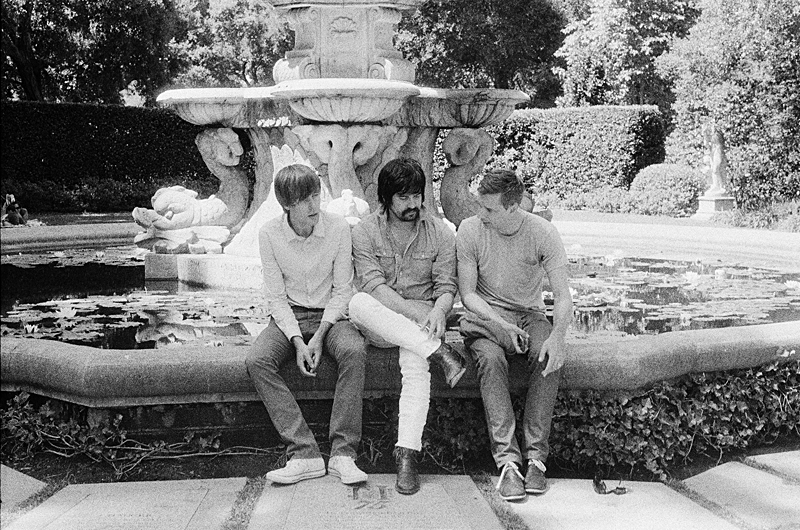“On the surface, Mister Heavenly is a handsome, charming, suave, smooth-talking, sexy catch,” says Mister Heavenly guitarist/vocalist Nick Thorburn, “but when you get to know him, he’s a creep, he’s a liar, he’s a thief [sings chorus from Meredith Brooks’ 1997 hit ‘Bitch’], he is an asshole, he is not to be trusted, and very two-faced, he’s duplicitous. I think that’s the character: the illusion of the ideal companion, and the reality is that Mister Heavenly is not so heavenly, and perhaps there’s no such thing.”
Thorburn, who’s also frontman of indie favorite Islands, says it was he and his bandmates’ love of gentler doo-wop rhythms that formed the basis of their compositions, but the underlying darkness of reality that kept creeping into their lyrics is what built their character, so to speak, as a band. “The general disillusionment,” he says. “We generally are pretty jaded. We’ve all come from other bands; we’ve been doing this for years, and we know that there’s snakes galore these days, and everywhere you turn, someone’s tryin’ to fuck you or rip you off.”
It all started with “Doom Wop”, a song in which Thorburn croons: “They talk about my baby,” in an innocent Fifties tone between gruff guitars and crashing drums. Conceived in a small New York jam space, the demo was picked up by Sub Pop, and the trio headed to Bear Creek Studio in Woodinville to lay down formal recordings for their debut album.
The dozen songs that comprise the band’s debut, Out of Love, were mixed and mastered in only 12 days, due to the members’ demanding schedules. “At the time, I wanted to disappear into the woods and never be seen again, because it was definitely stressful for everyone,” reflects keyboardist/vocalist Ryan Kattner. “But at the same time I think a very killer record came out of it, and no one got killed.”
What emerged was an album rife with doo-wop rhythms, psychobilly structures, hard-edged blues rock, and a conceptual design that the band has defined in interviews with the tag name “Doom Wop” as it has followed the same dichotomous arc as those original recordings. The group states the tracks took on an even more bizarre tone after being sent through the Woodinville studio with producer Ryan Hadlock.
“Did you know there’s a lot of Bigfoot sightings up there?” asks Kattner. “Bigfoot and drive-through bikini coffee joints. The vibe of those two dark things probably filtered in as well.”
In a roundabout sort of way, Kattner says, Elvis Presley may have also influenced the recordings, as one of the recording booths at Bear Creek could be the same one that Elvis cut his first song in. “There were two [at Sun Records] that day, and [Bear Creek] has one of them, so there’s a 50 percent chance.”
The band maintains there was no singular occurrence that pushed them on their semi-ironic course down Negativity Lane, but that it was influenced by more of a collective wealth of life experience, which is substantiated by some of their past projects. Kattner likens the contrasting fluffiness and dark subject matter on Out of Love to his other band, Philadelphia-based Man Man’s most recent album, this year’s Life Fantastic, but admits that the sound he and Thorburn had in mind was entirely its own creature: “We both like doo-wop, and it was a way to play off of that a little bit, write kind of darker songs and sweater sausage casings.”
For the Heavenly gang, the clear ringer was drummer Joe Plummer. While both Kattner and Thorburn have a catalogue of darker, more dystopian work under their belts (Thorburn has had a string of grown-up comic strips printed in Fantagraphics-published comic quarterly Mome, and a full-length comic book on the way), Plummer, who took time off from his full-time gigs drumming for Modest Mouse and The Shins to complete the trio, seems to be simply on a quirky interlude from the more upbeat leanings of his other projects. Having met Kattner while on tour, Plummer was not only an accomplished beat-keeper, but also a fan of Fifties doo-wop, which made the call easy for Kattner.
For Thorborn, it was apparently the charm that sold him on Plummer: “I immediately developed a man crush on Joe, because he’s charming and dresses well, he’s friendly and affable, and it went from there.”
When the band made its live debut at the Moore Theatre, opening for Passion Pit last November, the audience was treated to a surprise: actor Michael Cera on bass. Thorburn and Cera hit it off at a charity event, and the Juno star played bass on the band’s first tour (though he won’t be joining them this time around.) With the sheen of its supergroup appeal wearing off, the group has nothing to fall back on but the quality of its music, of which it has plenty. The trio is also anxious to return to the studio, although hopefully under less stressful conditions.
Kattner also makes clear that the band, like its doomed protagonist, is an ever- evolving entity, influenced by the strange tropes of everyday life.
“Being in a super-hot sauna and seeing some naked, orthodox Jewish rabbi dousing himself with a bucket full of water is totally bizarre,” he says. “Maybe he is Mister Heavenly.”





